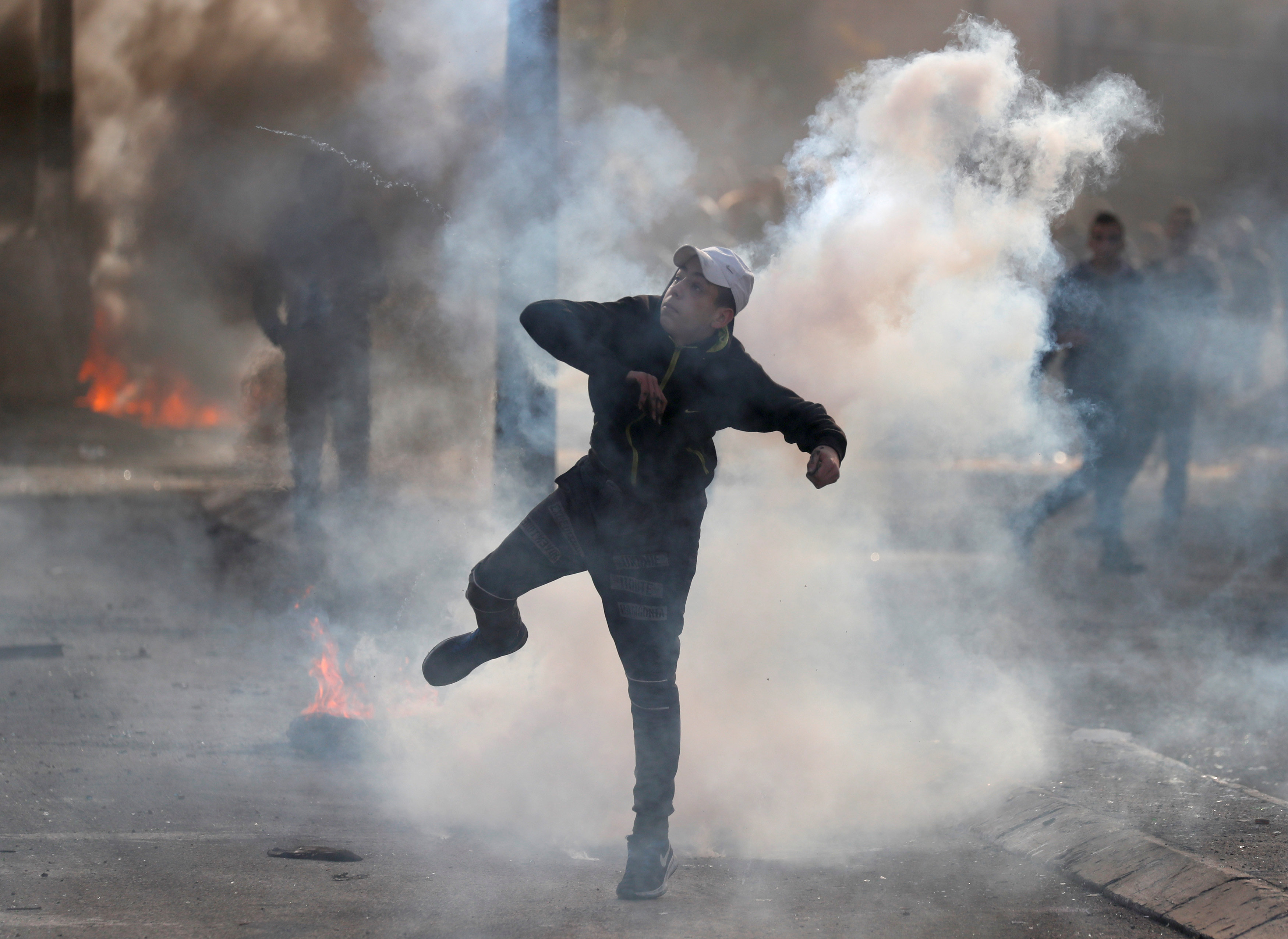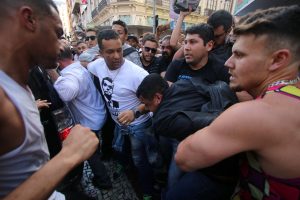
By Jeffrey Heller
JERUSALEM (Reuters) – A Palestinian stabbed an Israeli security guard at Jerusalem’s main bus station on Sunday, police said, and violence flared near the U.S. Embassy in Beirut over U.S. President Donald Trump’s recognition of Jerusalem as Israel’s capital.
Four days of street protests in the Palestinian territories over Trump’s announcement on Wednesday have largely died down, but his overturning of long-standing U.S. policy on Jerusalem — a city holy to Jews, Muslims and Christians — drew more Arab warnings of potential damage to prospects for Middle East peace.
“Our hope is that everything is calming down and that we are returning to a path of normal life without riots and without violence,” Israeli Defence Minister Avigdor Lieberman said on Army Radio.
But in Jerusalem, a security guard was in critical condition after a 24-year-old Palestinian man from the occupied West Bank stabbed him after approaching a metal detector at an entrance to the city’s central bus station, police said. The alleged assailant was taken into custody after a passer-by tackled him.
In public remarks on Sunday, Turkish President Tayyip Erdogan, a frequent critic of Israel, called it an “invader state” and a “terror state”.
Israeli Prime Minister Benjamin Netanyahu who spoke at a news conference in Paris alongside French President Emmanuel Macron after the two leaders met, fired back:
“I’m not used to receiving lectures about morality from a leader who bombs Kurdish villages in his native Turkey, who jails journalists, helps Iran go around international sanctions and who helps terrorists, including in Gaza, kill innocent people,” Netanyahu said.
Macron told Netanyahu that he needed to make gestures to the Palestinians to break the impasse between the two sides.
“I asked Prime Minister Netanyahu to make some courageous gestures towards the Palestinians to get out of the current impasse,” Macron said, suggesting that a freeze of construction in settlements could be a first step.
Most countries consider East Jerusalem, which Israel annexed after capturing it in a 1967 war, to be occupied territory and say the status of the city should be decided at future Israeli-Palestinian talks. Israel says that all of Jerusalem is its capital, while Palestinians want East Jerusalem as the capital of a future independent state.
The Trump administration has said it is still committed to reviving Palestinian-Israeli talks that collapsed in 2014, but jettisoning old policies is necessary to break the deadlock.
Washington says it has not taken a position on Jerusalem’s final status or borders, but it is sensible to recognize that any future peace deal will have Israel’s capital in the city.
The United States was “as committed to the peace process as we’ve ever been”, U.S. Ambassador to the United Nations Nikki Haley said on Sunday. Trump “didn’t talk about boundaries, he didn’t talk about borders… Because the final status of Jerusalem is between the Palestinians and the Israelis. It’s not for the Americans to decide.”
Palestinian President Mahmoud Abbas will not meet U.S. Vice President Mike Pence during his visit to the region, Foreign Minister Riyad Al-Maliki said on Saturday. The White House said on Sunday that decision was unfortunate and Pence looked forward to seeing Netanyahu and Egypt’s President Abdel Fattah al-Sisi.
“It’s unfortunate that the Palestinian Authority is walking away again from an opportunity to discuss the future of the region,” said Jarrod Agen, a spokesman for Pence.
Netanyahu reacted to critics in a statement before talks with Macron, to be followed by a meeting with European foreign ministers in Brussels on Monday.
“I hear (from Europe) voices of condemnation over President Trump’s historic announcement, but I have not heard any condemnation for the rocket firing against Israel that has come (after the announcement) and the awful incitement against us,” Netanyahu said.

A Palestinian protester throws back a gas canister fired by Israeli forces during a protest in the West Bank city of Bethlehem, December 10, 2017. REUTERS/Goran Tomasevic
DEMONSTRATIONS
In Beirut, Lebanese security forces fired tear gas and water cannons at protesters, some of them waving Palestinian flags, near the U.S. Embassy.
Demonstrators set fires in the street, torched U.S. and Israeli flags and threw projectiles towards security forces that had barricaded the main road to the complex.
In the Moroccan capital, Rabat, tens of thousands of protesters marched down the city’s main thoroughfare chanting slogans including, “The people want to liberate Palestine” and “Death to Israel, enemy of the people and provoker of wars.”
Waving Palestinian flags and holding up pictures of Jerusalem, they expressed anger at the “betrayal” by Arab governments perceived to have backed Trump’s move.
In the Indonesian capital Jakarta, thousands protested outside the U.S. embassy, many waving banners saying “Palestine is in our hearts”.
Maliki has said the Palestinians will be looking for a new peace talks broker instead of the United States and would seek a United Nations Security Council resolution over Trump’s decision.
Arab foreign ministers who met in Cairo on Saturday urged the United States to abandon its decision on Jerusalem and said the move would spur violence throughout the region.
Echoing that view, Abu Dhabi Crown Prince Sheikh Mohammed bin Zayed al-Nahayan, the de facto leader of the United Arab Emirates, said the U.S. move “could throw a lifebuoy to terrorist and armed groups, which have begun to lose ground” in the Middle East.
GAZA TUNNEL
Along Israel’s tense frontier with the Gaza Strip, the Israeli military on Sunday destroyed what it described as a “significant” cross-border attack tunnel dug by the enclave’s dominant Islamist group, Hamas.
There was no immediate comment from Hamas on the demolition, which came as Palestinian factions tried to meet Sunday’s deadline for an Egyptian-mediated handover of Gaza by Hamas to Western-backed President Abbas after a decade’s schism.
Pre-dawn Israeli airstrikes in the Gaza Strip on Saturday killed two Palestinian gunmen after militants fired rockets from the area into Israel on Friday.
(Additional reporting by Dan Williams and Ori Lewis in Jerusalem, John Irish in Paris, Tom Perry in Beirut, Agustinus Beo Da Costa in Jakarta, Sami Aboudi in Dubai, Doina Chiacu in Washington, and Jeff Mason in West Palm Beach, Florida; Editing by Peter Graff and Mary Milliken)











